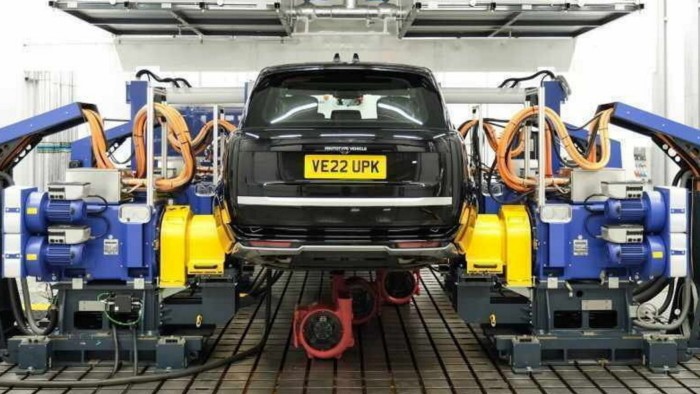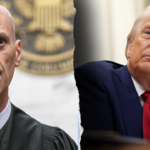Unlock the White House Watch newsletter for free
Your guide to what the 2024 US election means for Washington and the world
Downing Street has rejected suggestions by Donald Trump that Sir Keir Starmer is “very happy” about Britain being hit by 10 per cent US tariffs, as concerns grow in London about whether the US president will budge on the rate.
British officials said they were still trying to get clarity from the White House on whether a deal could be struck to reduce the 10 per cent tariff the US president has imposed globally. They said members of Trump’s trade team seemed uncertain about his intentions.
One British official said: “I’m not sure about cutting the 10 per cent.” But ministers cling to the hope that the US president will back down after he digests this week’s market meltdown.
For weeks, British ministers have talked up the possibility of a US-UK trade deal that could save the UK from Trump’s tariffs onslaught. But the US president has not spared London from 25 per cent tariffs on steel, aluminium and cars, and hit Britain with his 10 per cent baseline global levy despite its balanced trade relationship with America.
On Thursday he told reporters on Air Force One that Starmer was “very happy about how we treated them with tariffs”.
Downing Street rebuffed that suggestion on Friday, speaking of Starmer’s “disappointment”. A spokesman added: “We accept that the tariffs imposed on the UK put us in a relatively more favourable position than other countries, but of course, the impact on the UK will be real.”
In spite of Trump’s apparent insouciance over the US market slump caused by his trade policies, Starmer’s allies are hopeful the US president will in time see the case for cutting tariff rates across the board.
One official close to Starmer said: “We need to give them time to come back to earth, regroup and think through their next moves in the light of market and international moves.”
Ministers still say they want to persuade Trump to scrap the 10 per cent tariff that has ensnared the UK. Some countries received higher tariffs because they sell more goods to the US than they buy in return. The EU received a 20 per cent tariff.
But business secretary Jonathan Reynolds has indicated the UK may focus on trying to persuade Trump to reduce the 25 per cent tariff imposed on British cars sold into the US.
British Treasury minister James Murray said on Friday the UK’s priority was to negotiate a trade deal with Trump “at pace”. He told the BBC: “We want to see the additional tariffs removed.”
Meanwhile, Starmer is set to discuss the “shifting” global economic landscape precipitated by Trump’s trade war with fellow world leaders over the coming days, and press the need to strengthen partnerships in response.
The UK prime minister would hold a flurry of bilateral calls with British allies across multiple regions, according to officials. On Friday he spoke to Anthony Albanese, Australia’s prime minister, and Giorgia Meloni, his Italian counterpart and Downing Street said they “all agreed that an all-out trade war would be extremely damaging and is in nobody’s interests”.
Starmer’s spokesperson added: “The global economic landscape is shifting. It means we have a responsibility to work even more closely with other countries to maintain stability and strengthen our partnerships abroad.”
Reynolds has started a four week consultation with British business on possible retaliatory measures against the Trump tariffs, including targeted measures against selected products. However, he has made it clear that business does not want an escalation of a trade war.
British negotiators, including Britain’s US ambassador Lord Peter Mandelson, are looking at scrapping or scaling back Britain’s digital services tax, which mainly affects US tech groups, along with other concessions, such as cutting tariffs on certain meat and seafood products.
The UK is also trying to secure a tech partnership with the US as part of a broader economic deal, including regulatory changes to facilitate transatlantic co-operation.
Reynolds has dismissed suggestions that American criticism of free speech in Britain are part of trade negotiations and rejected the idea that the UK would water down its online safety laws to appease US tech firms.
“The talks I have had with my US counterparts are to do with goods, services, the regulation of professional bodies and all the things we would associate with normal trade talks,” Reynolds told MPs on Thursday.
“The United States is not seeking to make our children unsafe or more vulnerable. That is not the right approach to take to our key and core ally.”
Meanwhile, the government was expected to announce early next week flexibilities that would make it easier for carmakers to meet its electric vehicle sales targets, according to people close to the talks.
It completed its fast-track consultation with the industry last month that will include a long-expected decision on what types of vehicles carmakers can sell after a 2030 ban on new petrol and diesel cars come into force.
Those changes would likely allow carmakers to sell Prius-style hybrid models in the UK until 2035. Government insiders said the Trump tariffs on the car sector had accelerated an announcement.







